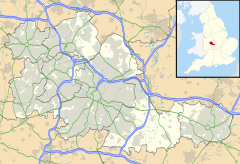Perry Barr
| Perry Barr | |
|---|---|
| Perry Barr shown within the West Midlands | |
| Population | 23,652 (2011Ward) |
| • Density | 29.7 per ha |
| OS grid reference | SP065919 |
| Metropolitan borough | |
| Metropolitan county | |
| Region | |
| Country | England |
| Sovereign state | United Kingdom |
| Post town | BIRMINGHAM |
| Postcode district | B42 |
| Dialling code | 0121 |
| Police | West Midlands |
| Fire | West Midlands |
| Ambulance | West Midlands |
| EU Parliament | West Midlands |
| UK Parliament | |
Perry Barr is an inner-city area in north Birmingham, England. It is also the name of a council constituency, managed by its own district committee. Birmingham Perry Barr is also a parliamentary constituency; its Member of Parliament is Khalid Mahmood.
The constituency includes the smaller Perry Barr ward, and the wards of Handsworth Wood, Lozells and East Handsworth, and Oscott, which each elect three councillors to Birmingham City Council.
"Perry" means small, and is derived from the Latin parva (not "pear", as some sources claim) and "Barr" means "hill". The name probably relates to the adjacent Great Barr, including Barr Beacon, the area's tallest peak.
Perry Barr was originally two separate entities, both mentioned in the Domesday Book as 'Pirio' and 'Barre'. Pirio is recorded as having an estimated population of 35 and Barre with an estimated population of 25. William FitzAnsculf is recorded as being the tenant in chief of both manors, and Drogo as the tenant. It is thought that the two manors may have been combined in the Early Middle Ages.
In 1874 Perry Barr established its own institute based on the model of the Birmingham and Midland Institute. Aston Villa opened their Wellington Road ground in Perry Barr in 1876, playing there until 1897. In 1878, Henry Irving became the president of the Perry Barr Institute and addressed members of the institute on March 6, 1878. His speech was reprinted in the March 13 release of Theatre and also reprinted onto pamphlets by the institute's members and sold for a sixpence to fund the construction of a new building for the institute. It was converted into a Carnegie-funded library in September 1897. In early 2007, this library, ultimately known as Birchfield Community Library, was demolished, due to its dilapidated condition. A new building is to be commissioned. Another library in the area is Tower Hill Library.
...
Wikipedia

